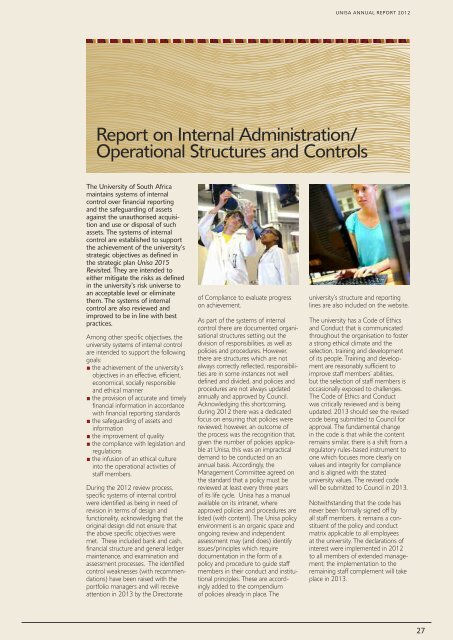ANNUAL REPORT 2012 - University of South Africa
ANNUAL REPORT 2012 - University of South Africa
ANNUAL REPORT 2012 - University of South Africa
Create successful ePaper yourself
Turn your PDF publications into a flip-book with our unique Google optimized e-Paper software.
UNISA <strong>ANNUAL</strong> <strong>REPORT</strong> <strong>2012</strong><br />
Report on Internal Administration/<br />
Operational Structures and Controls<br />
The <strong>University</strong> <strong>of</strong> <strong>South</strong> <strong>Africa</strong><br />
maintains systems <strong>of</strong> internal<br />
control over financial reporting<br />
and the safeguarding <strong>of</strong> assets<br />
against the unauthorised acquisition<br />
and use or disposal <strong>of</strong> such<br />
assets. The systems <strong>of</strong> internal<br />
control are established to support<br />
the achievement <strong>of</strong> the university’s<br />
strategic objectives as defined in<br />
the strategic plan Unisa 2015<br />
Revisited. They are intended to<br />
either mitigate the risks as defined<br />
in the university’s risk universe to<br />
an acceptable level or eliminate<br />
them. The systems <strong>of</strong> internal<br />
control are also reviewed and<br />
improved to be in line with best<br />
practices.<br />
Among other specific objectives, the<br />
university systems <strong>of</strong> internal control<br />
are intended to support the following<br />
goals:<br />
n the achievement <strong>of</strong> the university’s<br />
objectives in an effective, efficient,<br />
economical, socially responsible<br />
and ethical manner<br />
n the provision <strong>of</strong> accurate and timely<br />
financial information in accordance<br />
with financial reporting standards<br />
n the safeguarding <strong>of</strong> assets and<br />
information<br />
n the improvement <strong>of</strong> quality<br />
n the compliance with legislation and<br />
regulations<br />
n the infusion <strong>of</strong> an ethical culture<br />
into the operational activities <strong>of</strong><br />
staff members.<br />
During the <strong>2012</strong> review process,<br />
specific systems <strong>of</strong> internal control<br />
were identified as being in need <strong>of</strong><br />
revision in terms <strong>of</strong> design and<br />
functionality, acknowledging that the<br />
original design did not ensure that<br />
the above specific objectives were<br />
met. These included bank and cash,<br />
financial structure and general ledger<br />
maintenance, and examination and<br />
assessment processes. The identified<br />
control weaknesses (with recommendations)<br />
have been raised with the<br />
portfolio managers and will receive<br />
attention in 2013 by the Directorate<br />
<strong>of</strong> Compliance to evaluate progress<br />
on achievement.<br />
As part <strong>of</strong> the systems <strong>of</strong> internal<br />
control there are documented organisational<br />
structures setting out the<br />
division <strong>of</strong> responsibilities, as well as<br />
policies and procedures. However,<br />
there are structures which are not<br />
always correctly reflected, responsibilities<br />
are in some instances not well<br />
defined and divided, and policies and<br />
procedures are not always updated<br />
annually and approved by Council.<br />
Acknowledging this shortcoming,<br />
during <strong>2012</strong> there was a dedicated<br />
focus on ensuring that policies were<br />
reviewed; however, an outcome <strong>of</strong><br />
the process was the recognition that,<br />
given the number <strong>of</strong> policies applicable<br />
at Unisa, this was an impractical<br />
demand to be conducted on an<br />
annual basis. Accordingly, the<br />
Management Committee agreed on<br />
the standard that a policy must be<br />
reviewed at least every three years<br />
<strong>of</strong> its life cycle. Unisa has a manual<br />
available on its intranet, where<br />
approved policies and procedures are<br />
listed (with content). The Unisa policy<br />
environment is an organic space and<br />
ongoing review and independent<br />
assessment may (and does) identify<br />
issues/principles which require<br />
documentation in the form <strong>of</strong> a<br />
policy and procedure to guide staff<br />
members in their conduct and institutional<br />
principles. These are accordingly<br />
added to the compendium<br />
<strong>of</strong> policies already in place. The<br />
university’s structure and reporting<br />
lines are also included on the website.<br />
The university has a Code <strong>of</strong> Ethics<br />
and Conduct that is communicated<br />
throughout the organisation to foster<br />
a strong ethical climate and the<br />
selection, training and development<br />
<strong>of</strong> its people. Training and development<br />
are reasonably sufficient to<br />
improve staff members’ abilities,<br />
but the selection <strong>of</strong> staff members is<br />
occasionally exposed to challenges.<br />
The Code <strong>of</strong> Ethics and Conduct<br />
was critically reviewed and is being<br />
updated. 2013 should see the revised<br />
code being submitted to Council for<br />
approval. The fundamental change<br />
in the code is that while the content<br />
remains similar, there is a shift from a<br />
regulatory rules-based instrument to<br />
one which focuses more clearly on<br />
values and integrity for compliance<br />
and is aligned with the stated<br />
university values. The revised code<br />
will be submitted to Council in 2013.<br />
Notwithstanding that the code has<br />
never been formally signed <strong>of</strong>f by<br />
all staff members, it remains a constituent<br />
<strong>of</strong> the policy and conduct<br />
matrix applicable to all employees<br />
at the university. The declarations <strong>of</strong><br />
interest were implemented in <strong>2012</strong><br />
to all members <strong>of</strong> extended management;<br />
the implementation to the<br />
remaining staff complement will take<br />
place in 2013.<br />
27
















